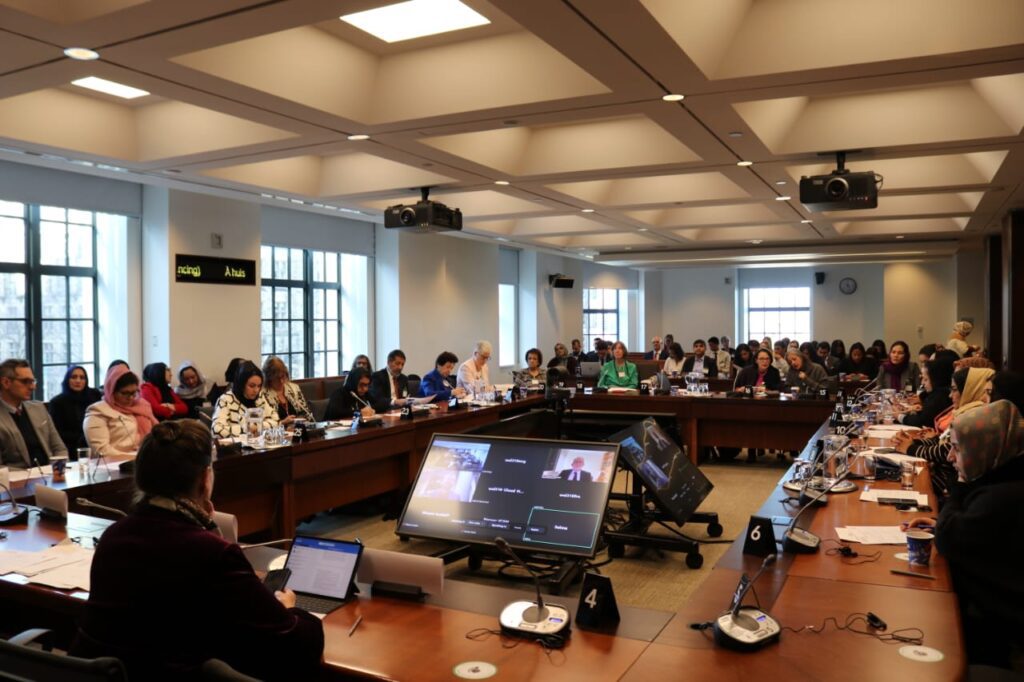WCRAN Presents Report on Women and Girls Under Taliban Rule to Canadian Parliament
The Women and Children Research and Advocacy Network (WCRAN) recently presented its investigative report, “The Impact of Taliban Edicts on Women and Girls in Afghanistan,” to Canadian Parliament members and foreign diplomats in Ottawa. This report sheds light on the dire conditions faced by Afghan women and girls under Taliban governance.
Highlighting Gender-Based Violence During the 16 Days of Activism
The report’s findings were shared during a parliamentary event that aligned with the 16 Days of Activism Against Gender-Based Violence campaign, dedicated to raising awareness regarding women’s status in Afghanistan. The gathering brought together a diverse assembly of politicians, human rights defenders, members of Parliament, senators, UN agency representatives, ambassadors, and women’s rights activists, with some participating both in-person and via virtual platforms.
Calls for International Solidarity
Ali Ehsassi, a member of the Canadian Parliament, expressed deep concern over the alarming decline of human rights in Afghanistan over the past three years, remarking that after two decades of social progress, the rights of all Afghan citizens are experiencing severe setbacks. Ehsassi urged for a unified international response to support the Afghan populace during these challenging times.
Taliban’s Systemic Attack on Women’s Rights
Pam Damoff, Parliamentary Secretary to Canada’s Minister of Foreign Affairs, highlighted the systematic efforts of the Taliban to oppress women and girls, leading many to feelings of hopelessness. She reaffirmed Canada’s dedication to combating these injustices under the purview of international law.
Focus on Gender Apartheid
Zarqa Yaftali, the head of WCRAN, elaborated on the organization’s recent findings, which expose the pervasive discrimination against women in Afghanistan under Taliban rule. She expressed hope for international support, particularly from Canada, to combat what she described as gender apartheid in the region.
Worrying Statistics on Women’s Rights
Sotoda Forotan, a WCRAN team member who presented the report, unveiled disturbing statistics regarding the state of women’s rights. The research meticulously analyzed significant areas, including employment restrictions, barriers to public participation, social engagement, educational access, political involvement, and incidence of gender-based violence under the Taliban regime.
Insights from Afghan Women Leaders
A head of a women-led organization in Afghanistan shared her insights on the challenges women and girls encounter when seeking aid and services. She provided targeted recommendations for enhancing international support for Afghan women.
Strategies for Effective Support
Senator Marilou McPhedran of Canada’s Senate underscored the necessity of formulating effective strategies to support Afghan women and girls, urging the need for wide-ranging collaboration to drive positive change.
Afghan Ambassador’s Appeal for Global Action
Hassan Soroush, Afghanistan’s ambassador to Canada, acknowledged Canada’s ongoing commitment to assist Afghan women and girls. He warned that the situation is continuously deteriorating due to systemic discrimination and called for an international coalition and proactive measures to tackle these pressing issues.
Concerns from UN Officials
Richard Bennett, the United Nations Special Rapporteur on Human Rights in Afghanistan, raised alarms regarding the increasing rates of domestic violence and mental health crises among Afghan women. He emphasized that normalization of relations with the Taliban should not proceed until notable advancements in human rights are achieved.
EU’s Commitment to Women-Centric Programs
Tomas Niklasson, the EU Special Envoy for Afghanistan, highlighted the significance of a “by women, for women” approach in EU aid initiatives, assuring participants that women are key contributors to the design of these supportive programs.
Importance of Women-Led Initiatives
Jacqueline O’Neill, Canada’s Ambassador for Women, Peace, and Security, praised the report as a courageous effort, noting that it stands as one of the few resources to truly understand the severe impacts of the Taliban’s decrees on Afghan women.
Expert Discussions on Support Mechanisms
During a subsequent roundtable discussion, experts exchanged views on enhancing support for Afghan women and girls. Civil society activist Aziz Rafiee urged a tripartite approach focused on women’s empowerment, network building, and protective services. Salma Zahid emphasized Canada’s essential role in ensuring educational access for girls.
Concerns for Afghanistan’s Future
Masooma Khawari, the former Minister of Communications and Information Technology in Afghanistan, raised concerns about the adverse effects of the Taliban’s restrictions on the country’s collective future. Homa Hoodfar called for an expansion of dialogues beyond education, advocating for robust connections between national and transnational women’s movements to prioritize women’s rights in international discourse.
Mobilizing Action Against Misogynistic Policies
Concluding the roundtable, Khadija Elham urged action against the Taliban’s misogynistic policies, which she identified as structured around four pillars: political exclusion, public presence bans, education prohibition, and employment denial.
Recommendations for Canada’s Role
Shoaib Rahim proposed that Canada enhance its international role by rallying other nations. He recommended the establishment of a dedicated committee within the Canadian Parliament to follow up on the report’s findings and ensure these issues are presented to the Canadian government. Additionally, he suggested that the report be disseminated by Canada’s UN representative to all member states to comprehensively address gender apartheid and human rights violations under Taliban decrees.
Persian Version Available
Read the Persian version of this daily report here:
یافتههای یک تحقیق درباره وضعیت زنان در افغانستان در پارلمان کانادا ارایه شد | روزنامه ۸صبح


